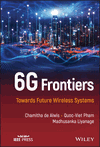Legal Aspects and Standardization of 6G Networks
Summary
Sixth-generation (6G) introduces a new landscape for mobile communication. This requires new legal framework and standardization efforts. This chapter focuses on 6G legal aspects and standardization approaches. The evolving 6G landscape will also demand changes in legal and regulatory domains. For instance, 6G mobile networks will heavily depend on artificial intelligence technologies such as machine learning and deep learning, to optimize network performance while enhancing efficient resource utilization and user experience. Standardization is important to define the technological requirements of 6G networks and also to select the suitable technologies to deploy 6G network. Many Standards Developing Organizations are working or at least planning to work on 6G standardization. Next Generation Mobile Networks is an association which is focusing on mobile telecommunications standard development. The Association of Radio Industries and Businesses promotes R&D of new radio systems to achieve the efficient use of the radio spectrum.



